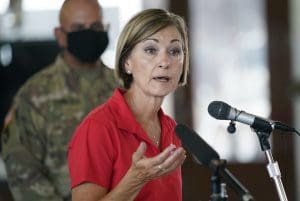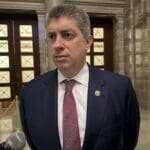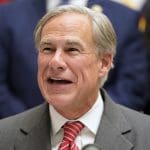Iowa governor refuses to promote virus safety measures for football games
Iowa has the second-highest per capita average number of new coronavirus cases in the country.

Iowa Gov. Kim Reynolds on Wednesday dismissed concerns that having 25,000 people attend a football game might make her state’s spiking coronavirus caseload even worse. “If you don’t think it’s safe, don’t go,” she told residents of the state.
Asked by a reporter if, given the especially high number of new cases around Ames, the home of Iowa State University, she was concerned about fans in the stadium spreading the virus at an upcoming college football game there, Reynolds answered that it was important “to help maintain the safety and health of Iowans, but also the livelihood and to start to try to find ways that we can get our lives back to normal. We can do these things safely and responsible. We can open our schools back up. We can open our colleges back up. We can continue to move forward. But we have to have personal responsibility. We have to be aware of what the data is and then we have to make decisions based on that.
“So if you have underlying conditions and you’re a part of a vulnerable population, maybe I wouldn’t go to the Iowa State football game next week.”
Reynolds then noted, “It’s 25,000 out of a capacity of 61,500,” said that the event would be outdoors, and suggested that attendees “should, I’m sure, should wear a mask.”
“Don’t go. If you don’t think it’s safe, don’t go,” she concluded. When the reporter pressed her about the Iowa State students’ safety, Reynolds cut her off, saying, “I’ve answered the question.”
Later on Wednesday afternoon, Iowa State announced that it would not allow fans to attend the game, citing community “feedback.” The decision, the university’s statement noted, was actually made on Tuesday night — prior to Reynolds’ press conference.
A spokesperson for the governor did not immediately respond to an request for comment.
Earlier this week Iowa became the state with the highest daily average of new infections over seven days, per capita: 37 infections for every 100,000 people. On Wednesday, it fell to second-worst, behind South Dakota.
The local political website Iowa Starting Line reported on Monday that two major Iowa college towns — Ames and Iowa City — ranked as the sites of the number one and number two worst coronavirus outbreaks in the entire country. Per capita, their rates were worse than any industrialized country, making them two of the biggest hot spots in the world.
Reynolds has done relatively little to curb the spread of the coronavirus in her state.
She was one of just seven governors who refused to issue any statewide stay-at-home orders when the pandemic began, ignoring the advice of Surgeon General Jerome Adams, who in April urged the entire nation to stay home.
In May, she and four other Republican governors authored a Washington Post opinion piece titled, “Our states stayed open in the covid-19 pandemic. Here’s why our approach worked.” “Our collective experience ensures that our contribution toward reopening our nation’s economy is stable, safe and durable,” they wrote.
“Restarting our economy is not a race to be won but a cooperative effort. Our approach has created a model for success that can be applied throughout the country.”
Iowa had one of the nation’s higher per capita caseloads at the time. It has gotten worse since, as Reynolds rushed to reopen businesses, demanded schools resume in-person instruction, and refused to issue a statewide mask mandate.
More than 64,000 Iowans have contracted the coronavirus — more than 2% of the state’s population — and more than 1,100 have died.
Published with permission of The American Independent Foundation.
Recommended

Ohio Gov. DeWine said he didn’t know of millions in FirstEnergy support. Is it plausible?
Ohio Gov. Mike DeWine’s claim to not know about the millions an Akron utility spent supporting his 2018 campaign for governor simply isn’t credible, an Ohio political scientist said in a recent interview. A spokesperson for DeWine pushed back. FirstEnergy provided that support, then spent more than $60 million to pass and protect a $1.3 billion ratepayer-financed […]
By Marty Schladen, Ohio Capital Journal - April 29, 2024
Missouri governor hopeful Bill Eigel rejects affordable childcare proposal
Eigel has previously supported stripping funds from public schools and once opposed an expansion of early kindergarten.
By Jesse Valentine - April 15, 2024
Montana Gov. Greg Gianforte hosts event with religious extremist
J.P. De Gance is the founder of Communio, an organization that uses social media marketing tools to push a far-right agenda.
By Jesse Valentine - March 27, 2024







































































